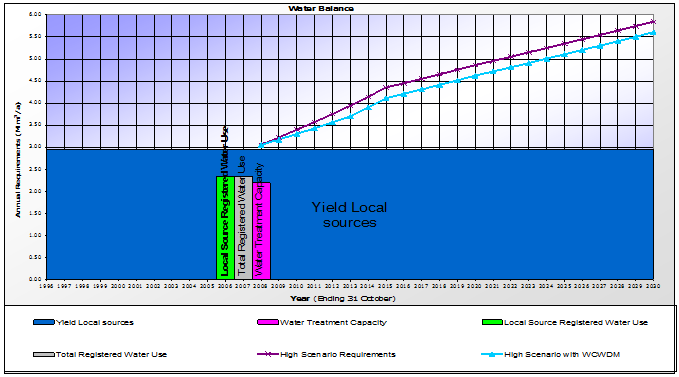HOME
This Home Page provides a summary of the All Towns Reconciliation Strategies for the Northern Planning Region;
how needs can be met to 2035 and beyond as water requirements continue to grow.
More detail is provided under the page tabs above.
STRATEGIES AREA
Area of supply
The Northern Planning Region study area includes the Water Management Areas (WMA) of Limpopo, Luvuvhu and Letaba, Crocodile (West) and Marico, and Olifants,
as defined in NWRS 2004. It encompasses the entire Limpopo Province, the northern parts of the North West and Gauteng
Provinces and the north-western part of the Mpumalanga Province respectively. The area covers eight District Municipalities and one Metropolitan Municipality and
229 separate town strategies. A number of towns in this region are supplied from Water Boards, which to a large extent, are already incorporated in the larger Vaal River Reconciliation Strategy,
Olifants River Reconciliation Strategy and the Luvuvhu and Letaba Reconciliation Strategy (finalised in January 2015).
Sources of water
Key sources of water are the Crocodile (West), Marico, Limpopo, Matlabas, Mokolo, Lephalala, Mogalakwena, Sand, Nzhelele, Luvuvhu, Mutale, Letaba, Elands, Wilge, Steelpoort and Olifants Rivers.
Water supplied from Rand Water originates in the Vaal River System. Groundwater is a viable source of water for many towns in the study area.
Climate change
Climate Change predictions are for a decline in rainfall for this region. Along with increasing temperatures and hence evaporation,
the implications for run-off and long-term assurance of supply are potentially serious.
PLANNING FOR THE ALL TOWNS WATER SUPPLY SYSTEMS
For more detail please refer to the Steering Committee,
Stakeholder Engagement, and
Reports & Documents pages.
The All Towns Reconciliation Strategies for the Northern Planning Region were part of a programme of All Towns Reconciliation Strategies studies for the All Planning Regions
(i.e. Northern, Central, Eastern and Southern Planning Regions). The All Towns Reconciliation Strategies for the Northern Planning Region (and other Planning Regions)
were completed in 2011. This study is a continuation of the first All Towns study and aims to systematically improve certain high priority strategies in the reconciliation of
water requirements, with water available from sources. It includes the review of demographics, service levels, water requirements, water services infrastructure, water
resource availability (from existing information), water quality and updating of the water balance.
The strategies have as Planning Objectives to reconcile future water requirements with supply
for a 20-year planning horizon, and to provide a framework for decision-making with regard both to securing supply and managing demand. The strategies are updated regularly to keep this time horizon,
adapting to the changing situation and incorporating new information as this becomes available. For this Strategies Steering Committees have been established.
STRATEGIES STEERING COMMITTEES
The Strategies Steering Committees (one for each province) were established on completion of the strategies in 2011. The Strategies Steering Committees (SSC) relevant to the
All Towns Reconciliation Strategies for the Northern Planning Region were established for Limpopo, North West and Mpumalanga. The SSC for Mpumalanga is supported by the
Eastern Planning Region study team with contributions from the Northern Planning Region study team relevant to the Mpumalanga part of the Northern Planning Region Study Area.
The SSC for Gauteng is supported by the Central Planning Region study team. The Strategies Steering Committees include key stakeholders involved in water resources management,
including organised agriculture, mine/ industries, Water Boards, relevant District and Local Municipalities, and the Department: Water and Sanitation (DWS) national and regional offices.
Strategies Steering Committees actively monitor implementation of the strategies by all role-players, are responsible for ensuring that
the Strategies are regularly updated and for keeping institutions and the public informed.
RECONCILIATION STRATEGIES
All Towns Reconciliation Strategies
The reconciliation strategies development for towns and village clusters focused on existing water resources and supply schemes,
considered both current and expected future water requirements, along with the potential water resources available to meet these requirements.
Strategies have aimed to reconcile water requirements with availability, with the overall objective being to keep towns and village clusters always with a
positive water balance, at least for the planning horizon of 20 years (up to 2035). Water resource management/development interventions necessary to achieve this
objective form part of the strategies. For the individual All Towns Reconciliation Strategies consult the Integrated Water Planning Portal – Strategies Portal
on the Reports & xDocuments page of this web-site.
Reconciliation strategies were categorised according to the following:
| Water Balance Status |
Category |
| Water Balance Status |
4 |
High |
| Town will be in deficit within 5 years |
3 |
Medium to high |
| Town will be in deficit in 5 to 10 years |
2 |
Medium |
| Town will be in deficit after 10 years or later |
1 |
Low |
 Figure 1: Category 4 / High Priority (currently in deficit) Water Supply System yield and water requirements
Figure 1: Category 4 / High Priority (currently in deficit) Water Supply System yield and water requirements
Strategies were further prioritised according to the following steps, for the continuation of the study:
- Step 1: Identification of Category 4 strategies (towns with a water balance currently in deficit);
- Step 2: Eliminate towns where solutions are in an advanced stage of planning or implementation (RBIG projects);
- Step 3: Add towns where RBIG or other processes are in an early stage of planning – can still be influenced by strategies’ recommendations; and
- Step 4: Add any other hot spot areas identified on a national, provincial or local strategic level.
The list of priority strategies were presented and refined at the first SSC Workshops, held in each Province.
SITUATION SUMMARY
Key general findings of the All Towns Reconciliation Strategies for the Northern Planning Region are as follows:
|